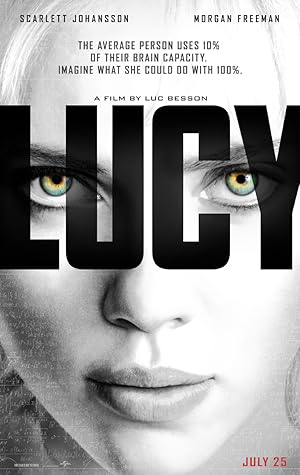Lucy
| 2014Directed by: Luc Besson
Main Plot
Lucy follows the story of a young woman who is unwittingly caught in a dark deal when a drug is surgically implanted in her abdomen. As the drug begins to leak into her system, Lucy gains extraordinary mental and physical abilities, unlocking the full potential of her brain. As her powers grow, she becomes increasingly aware of her surroundings and the world around her, leading her to seek out answers about her condition. With time running out and her abilities escalating, Lucy teams up with a scientist who studies the brain to understand the implications of her transformation. As she navigates through a series of intense confrontations and challenges, Lucy's journey becomes a quest for knowledge and power, ultimately exploring the limits of human potential and the nature of existence itself.
Characters
- Scarlett Johansson plays Lucy, a woman who gains superhuman abilities after a synthetic drug unlocks her brain's full potential, leading her on a quest for knowledge and survival.
- Morgan Freeman plays Professor Samuel Norman, a scientist whose research on brain capacity becomes crucial as he helps the protagonist understand and harness her rapidly expanding abilities.
- Choi Min-sik plays Mr. Jang, a ruthless Korean drug lord who forcibly uses Lucy as a drug mule, setting off the chain of events that drive the plot.
Ending Explained
In the ending of Lucy, the protagonist reaches the pinnacle of her cognitive abilities after absorbing a synthetic drug that enhances her brain function. As she approaches 100% brain capacity, Lucy experiences a transformation that transcends human limitations. The climax occurs when she confronts the antagonists who seek to exploit her newfound powers. By this point, Lucy has gained the ability to manipulate time and space, showcasing her evolution from a vulnerable individual into a nearly omnipotent being. In a pivotal moment, Lucy uploads her knowledge into a supercomputer, effectively sharing her consciousness with humanity. This act symbolizes her desire to transcend the physical realm and connect with all of humanity, suggesting that knowledge and understanding are the ultimate forms of power. As she fades away, she leaves behind a message about the importance of knowledge and the potential of the human mind. The film concludes with a police officer discovering a flash drive containing Lucy's accumulated knowledge, implying that her legacy will continue to impact the world. This resolution ties back to the film's exploration of human potential and the consequences of pushing the boundaries of consciousness, ultimately suggesting a hopeful future for humanity through the pursuit of knowledge.
